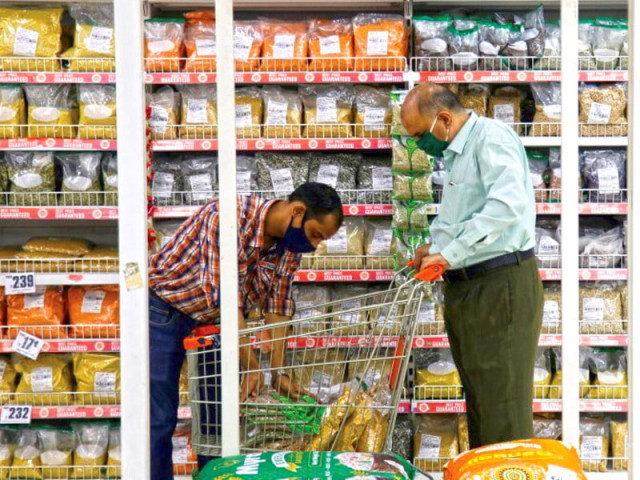Ministry sees further hike in inflation
Remains shy of giving number; officials expect 13% inflation for January

The government said on Thursday that the inflation rate might further accelerate this month while Finance Minister Shaukat Tarin proposed to give fuel cards to motorcyclists and relax the taxable income threshold to bail out the inflation-stricken salaried class.
The Ministry of Finance released its Monthly Economic Outlook report for January 2022 but remained shy of giving an inflation number.
“The year-on-year inflation in January 2022 may slightly accelerate,” said the ministry’s report. However, it added that month-on-month inflation may decline.
Sources in the finance ministry told The Express Tribune that the projected inflation number for January was around 13%, which was why the ministry decided against adding it to the official report. The economic adviser’s wing prepared the report.
However, it is just a matter of days before the nation will know about the exact pace of inflation as the Pakistan Bureau of Statistics (PBS) will release its monthly bulletin on February 1.
The inflation rate stood at 12.3% in December 2021, which was the highest reading in the past almost two years.
The report was released a day after Finance Minister Shaukat Tarin said that the “super inflation cycle” would stay in place for the next two to three months.
Tarin on Thursday floated four proposals in a meeting of the Economic Advisory Group (EAG) to provide some relief to the salaried class in the face of rising inflation.
He suggested giving fuel cards to the motorcyclists for getting subsidised petrol and increasing the minimum taxable income threshold from Rs600,000 to Rs700,000 or Rs800,000 per year.
The minister also proposed that private sector should be encouraged to start internship programmes for new entrants in the job market and the grant of subsidised plots to the middle-income group.
Read Inflation continues to rise unabated
However, the idea of subsidised plots was opposed by the EAG members but the other three ideas were discussed in detail.
However, Tarin’s idea to relax the taxable salary limit may be opposed by the International Monetary Fund (IMF), which has already asked Pakistan to lower the threshold to around Rs400,000 and also reduce the number of slabs to collect more taxes from the salaried class.
In its monthly report, the finance ministry blamed external factors for the growing inflation rate but ignored the government’s policies that were fueling inflation.
In the midst of the inflationary storm, the government has enforced a Rs360 billion mini-budget, which imposed tax on almost every consumable item including bread, bakery items, milk, mobile phones and cars.
The finance ministry said that the overall spike in the Consumer Price Index (CPI) was due to the increase in prices of imported items. It added that Pakistan’s inflation rate was still under pressure like other countries due to the rise in international commodity prices as well as expectations of economic agents.
The finance ministry said that if future month-on-month price movements stabilised, the yearly inflation would automatically fall back to levels required to support Pakistan’s economic development.
The finance ministry listed inflation among the three risks that could undermine economic growth.
Certain risks exist in the economy including the spread of Omicron variant, inflationary and external sector pressures due to the rebounding global commodity prices, it added.
The rising global inflation along with a significant increase in transportation cost and the subsequent supply chain disruption is expected to make international trade costly.
The ministry said that the growing trade balance was also posing a challenge to the economic outlook.
The current account posted a deficit of $9.1 billion, or 5.7% of GDP, for the July-December period of current fiscal year due to the persistent growth in import volumes of energy and non-energy commodities, said the ministry.
Read more Inflation outlook highly uncertain: ECB
The Ministry of Planning had projected a $2.2 billion current account deficit for this fiscal year. State Bank of Pakistan Governor Dr Reza Baqir said in August that the annual current account deficit would be in the range of $6.5 billion to $9.5 billion for fiscal year 2021-22.
At the same press conference, the governor had also given the good news of record foreign exchange reserves of nearly $20 billion. But the reserves held by the SBP dipped to $16.2 billion by January 21, which was the lowest level since November 2021, when the central bank held gross reserves of $16 billion.
The finance ministry said that excess imports compared to exports would gradually ease in the coming months.
This expected tendency is enforced by government measures designed to stimulate exports and moderate import demand. Monetary policy decisions are also supportive in this respect, it added.
After increasing interest rate by 2.75%, the SBP maintained the policy rate at 9.75% in this week’s meeting.
The finance ministry said that the trade deficit would settle at lower levels in January, although unlike past it did not give any projection of the trade deficit.
But the ministry hoped that with the expected improvement in the trade balance, the current account deficit may start declining in January.
Published in The Express Tribune, January 28th, 2022.
Like Business on Facebook, follow @TribuneBiz on Twitter to stay informed and join in the conversation.



















COMMENTS
Comments are moderated and generally will be posted if they are on-topic and not abusive.
For more information, please see our Comments FAQ